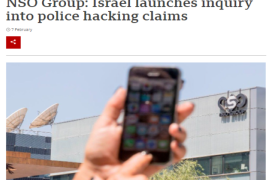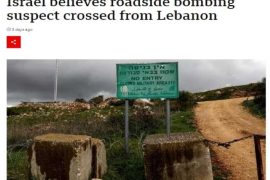Throughout the day on November 23rd BBC radio audiences repeatedly heard statements relating to the frequency of bus bombings in Israel from the BBC Jerusalem bureau’s Tom Bateman and Yolande Knell:
REVIEWING INITIAL BBC RADIO REPORTING ON JERUSALEM TERROR ATTACKS
Bateman: “…but certainly the use of explosives in Jerusalem would be the most significant attack of its kind in years.”
Copnall: “Yeah but if you go back 15, 20 years, bus bombings were relatively common were they not?”
Bateman: “Well during the years of the second Palestinian intifada – or Palestinian uprising – from 2000 to [connection lost] it was a frequent occurrence, a frequent tactic used by…ehm…err…Palestinian attackers back then. You know, that kind of thing had subsided in terms of its frequency since those days.”
REDUNDANT FRAMING IN BBC RADIO REPORTING ON JERUSALEM TERROR
Knell: “Bombings were a feature of the second Palestinian uprising which began more than two decades ago but Jerusalem hasn’t seen one in seven years.”
Knell: “For many here this brings back bad memories of the second Palestinian uprising in the early 2000s which saw a series of deadly bus bombings.”
Knell: “…to put this in perspective, while Israel did see these repeated deadly bus bombings – usually suicide attacks by Palestinian militants – in the second Intifada or uprising in the early 2000s, there has not been a coordinated attack like this for years.”
The following day a statement was put out by the Israeli Security Agency relating to a plot which had been thwarted over three weeks earlier.
“Israeli security forces arrested a Palestinian man from the Gaza Strip last month, suspecting him of planning a bombing attack on a bus in southern Israel on behalf of the Palestinian Islamic Jihad terror group, the Shin Bet security service said Thursday.
The agency said that Fathi Ziad Zakot, 31, from the southern Gazan city of Rafah, had a valid permit to enter Israel for work. He was arrested on October 30 and an indictment was filed on Thursday at the Beersheba District Court, whereupon the Shin Bet released information about the case.
According to the Shin Bet, Zakot was recruited by a member of the Palestinian Islamic Jihad sometime in September, and later underwent training by an explosives expert who taught him how to build a bomb.
Zakot entered Israel several times while remaining in contact with members of the terror group. After entering on October 19, Zakot obtained wires, batteries and other materials used to build an explosive device, according to the indictment.”
As noted by the Jerusalem Post:
“In June, Israel increased the number of labor permits for Palestinians in the Gaza Strip by 2,000 for a total of 14,000. […]
On Thursday, Gantz said terrorist groups taking advantage of the permits “endangers the livelihood of hundreds of thousands of residents in the Gaza Strip.”
“We are conducting an ongoing assessment of the situation, and if it appears that there is a trend of recruiting workers from Gaza to carry out attacks, Israel will consider its steps in the context of the workers from the Gaza Strip and other civilian measures,” he warned.”
Remarkably, journalists at the BBC’s Jerusalem bureau who only a day earlier had told BBC audiences that bus bombings in Israel had become a thing of the past and who frequently report on the dire economic situation of residents of the Gaza Strip, showed no interest whatsoever in reporting that story.






BBC – The terrorist murderers’ friend, the ally of Iran and the arch antisemitic conspirator. Come on Richi – close down this disgrace of a “news” medium.